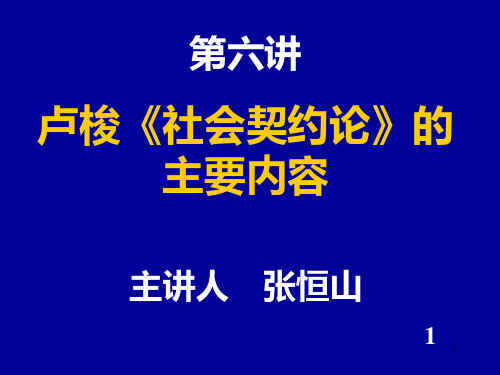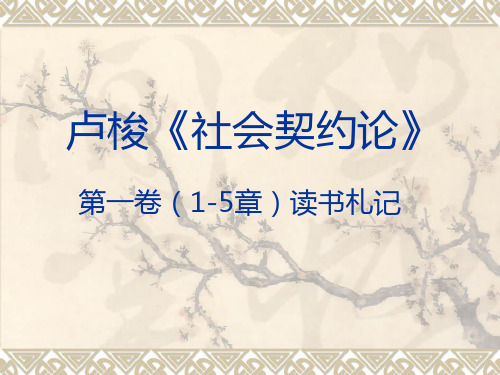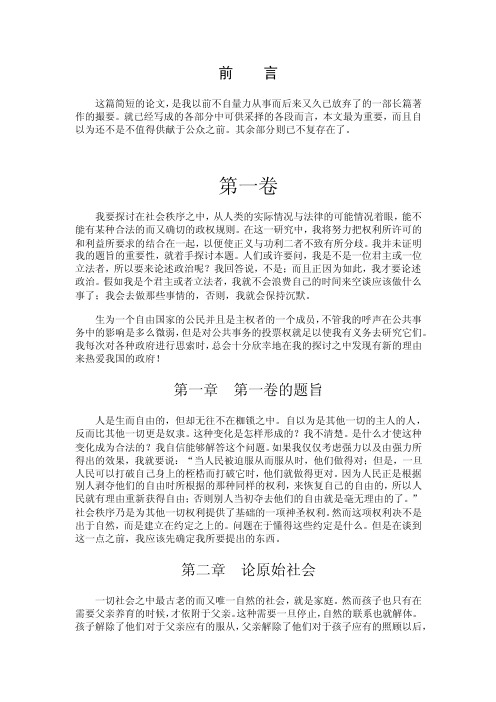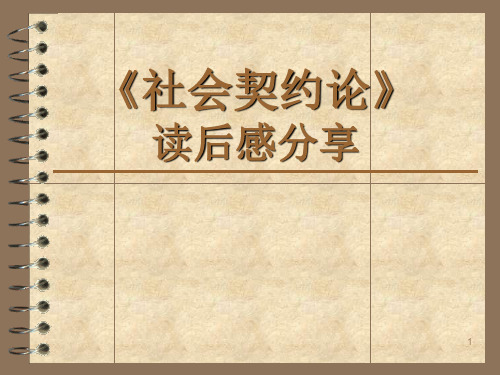社会契约论第一卷 PPT
斯坎伦 新社会契约论伦理学26页PPT

26、机遇对于有准备的头脑有特别的 亲和力 。 27、自信是人格的核心。
28、目标的坚定是性格中最必要的力 量泉源 之一, 也是成 功的利 器之一 。没有 它,天 才也会 在矛盾 无定的 迷径中 ,徒劳 无功。- -查士 德斐尔 爵士。 29、困难就是机遇。--温斯顿.丘吉 尔。 30、我奋斗,所以我快乐。--格林斯 潘。
61、奢侈是舒适的,否则就不是奢侈 。——CocoCha nel 62、少而好学,如日出之阳;壮而好学 ,如日 中之光 ;志而 好学, 如炳烛 之光。 ——刘 向 63、三军可夺帅也,匹夫不可夺志也。 ——孔 丘 64、人生就是学校。在那里,与其说好 的教师 是幸福 ,不如 说好的 教师是 不幸。 ——海 贝尔 65、接受挑战,就可以享受胜利的喜悦 。——杰纳勒 尔·乔治·S·巴顿
《社会契约论》课件

写作背景
18世纪
欧洲社会经历着深刻的变革,资本主 义的发展、封建制度的衰落以及思想 文化的激荡都在这一时期交织。
法国大革命前夕
社会矛盾激化,政治腐败盛行,卢梭 目睹了贫富悬殊、阶级压迫和民族危 机等社会问题,开始深入思考国家和 社会制度的根源。
作品影响
对政治哲学的影响
对世界民主运动的影响
《社会契约论》提出了以人民主权为 核心的政治哲学思想,成为现代民主 制度的基石,影响了后世无数的政治 家和思想家。
社会契约论对现代民主政治的影响
民主政治的基石
社会契约论强调个人权利和自由 ,为现代民主政治提供了理论基 础,强调政府权力来自人民的授
权。
限制政府权力
社会契约论认为政府权力是有限 的,必须受到制约,以保护人民
的权利和自由。
推动法治建设
社会契约论强调法律的重要性, 主张通过法律来规范政府行为,
保障人民的权利。
THANKS
感谢观看
社会契约论为全球治理提供了理论基础,强调各国之间的合作和 共同利益。
国际法的地位
社会契约论认为国际法是维护国际秩序的重要工具,有助于保障各 国的权利和利益。
跨国合作与全球治理
社会契约论主张通过跨国合作来实现全球治理,推动国际社会的和 平与发展。
05
社会契约论的当代意义
维护世界和平与发展的
03
抽象性
社会契约论的抽象性和假 设性较强,难以完全适用 于现实世界的复杂情况。
忽视历史和现实
社会契约论在某种程度上 忽视了历史和现实中的政 治、经济和社会因素对政 治制度的影响。
个人主义倾向
社会契约论强调个体的权 利和自由,可能导致对集 体利益的忽视,具有一定 的个人主义倾向。
最新【心理激励指导】第九讲卢梭《社会契约论》讲学课件

二、实验任务 1.查看CDP邻居信息,并以此信息为基础,远程登录到邻居 设备. 2.管理呼入、呼出Telnet会话。
三、实验设备 路由器Cisco 2611两台或工作站PC一台,控制台电缆一条。
四、“CDP协议和Telnet”实验环境
【心理激励指导】第九讲 卢梭《社会契约论》
一、生平与著作
卢梭(让·雅克·卢梭)(1712——1778),法国著名启蒙思想家、哲学家、教育 家、文学家,是18世纪法国大革命的思想先驱,启蒙运动最卓越的代表人物 之一。主要著作有《论人类不平等的起源和基础》、《社会契约论》、《爱 弥儿》、《新ig)#no cdp run 图4-1-2 在全局配置模式下设置CDP
图4-1-3 启用或禁用CDP
3.显示CDP信息
show cdp neighbors show cdp neighbors Fastethernet 0/1 show cdp neighbors detail show cdp interface show cdp entry show cdp traffic
192.168.0.1/24)、路由器RouterB的串行接口Serial 0/0接口 IP地址(192.168.0.2/24)并同时激活接口。 4.配置路由器RouterA的串行接口Serial 0/0接口时钟频率为 64000。 5.使用Ping命令测试路由器RouterA和路由器RouterB之间的连 通性。 6.练习4.1.1节中介绍的各种CDP命令。 7.练习4.1.2节中介绍的管理Telnet会话的各种命令。
DCE
S0/0:192.168.0.1/24 RouterA Encapsulaton PPP
卢梭《社会契约论》 共40页

只有全部转让,才能做到没有任何人奉献出自己,而人们 可以从社会得到同样的权利,并增加社会的力量以及保护 自己的利益。他认为只有通过这种方式建立的集合体才能 体现人民最高的共同意志。而他之谓国家或者社会的产生 也正是在这样一种严格规定的方式下通过协议而产生的。
1
假设
2
方式
4
缺陷
3
国家
再次,人民在什么时候、什么地点、以何种方式达成 了所谓的社会契约之无法证明。
几个问题: a. 人是否生而自由平等的?如果是,那么前人的契约
自然无法约束后人,哪怕是为了他们的利益。因为 ,后人享有和他们对等的选择自己的生活的权利。 如果不是,那么社会契约是如何达成的。
b. 于是,紧接着下来的这个问题,将更加深刻。因为 如果人与人之间,不是平等而自由的,那么,社会 契约论的基础将不复存在。这时候,我们又不禁要 问,在这样一种悖论的情况下,社会契约论的存在 还有什么意义?
1
假设
2
方式
4
缺陷
3
国家
本身缺陷
1 前提之无法证明 2 前人不能为后人立法 3 强调公意不利于人权保护
但是其前提是,我们必须认为卢 梭提出的假设或者前提为真,因 为“任何从错误的前提推导出的 结论,其正确性都是值得怀疑 的。”
首先,人是生而自由平等的是无法直接证明的。 其次,所谓绝境的出现,其证明也是有相当难度的。
国家产生
总而言之,国家的产生是基于公意的 。正是如此,所以国家的立法权属于 也只能属于人民。
“公共力量就必须有一个适当的代理人把它结合在一起, 并使它按照公意的指示而活动;他可以充当国家与主权者 之间的联系,他对公共人格所起的作用很有点象是灵魂与 肉体的结合对一个人所起的作用那样。这就是国家之中所 以要有政府的理由;政府和主权者往往被人混淆,其政府 只不过是主权者的执行人。”
卢梭社会契约论的主要内容PPT课件

卢梭《社会契约论》的 主要内容
主讲人 张恒山
1
.
1
一、简要生平
卢梭(J.J.Rousseau,1712-1778年)是法 国著名思想家,18世纪启蒙运动的倡导人之 一。
出身钟表工人家庭,12岁谋生,自学,
著作包括: 《科学和艺术的复兴是否 有助于敦风化俗》(1750),《政治经济学》 (1755),《论人类不平等的起源和基础》 (1755), 《新爱绿绮丝》(1761), 《社会契 约论》(1762),《爱弥儿》(1762) 等。
第四章 论贵族制
本章讨论贵族制政府的特点及其得
失。
.
1155
第六章 论国君制 本章讨论国君制的特点和得失。
第七章 论混合政府
本章论述混合型政府的特点及其得 失。
第八章 论没有一种政府形式适宜于一切国家
本章中,卢梭论述了气候和物产决
定了不同的国家适用于不同的政体。
.
16 16
第九章 论一个好政府的标志
第四章,论奴隶制
本章主题:只有约定才能成为人
间合法权威的基础,但是,对奴隶的
统治不可能建基于约定。
.
44
第五章 论总需追朔到一个最初的约定
本章主题:在说明由人民中产生君 主之前,首先应当研究并说明使人民这 一集合体得以形成的最初的约定。
第六章 论社会公约
本章主题:讨论社会公约(即最初
约定)的原因、社会公约的主要目的和
.
1199
第十七章 论政府的创制
本章进一步论述人民创设政府行 为的法律性质——这是立法性行为和 执法性行为的复合行为。
第十八章 防止政府篡权的方法
本章讨论如何对政府篡夺主权者
的权力的倾向加以防范。
卢梭社会契约论ppt

洛克 霍布斯 卢梭
西方近代社会契约学说
在中世纪以前,人类几乎所有的文明都认为国王或皇帝是神圣的,上 帝将权力赐予某些人,这些人和他们的后裔就组成了政府,任何对政 府的反叛行为都是对神的不敬,这就是神权理论。15世纪以后,宗教 革运动的展开、文艺复兴时期科学人文主义的兴起和统一民族国家的 建立,不但否定了教会的权威,动摇了建立于宗教教义基础上的社会 秩序的基础,也助长了个人主体意识的发展,同时在客观上也促使人 们尝试着去寻求民族国家政权形式的合法性基础,社会契约论思想也 开始由古代形态向近代的古典形态过渡,它开始逐步被引入政治生活 领域,作为确立政治权威与服从的基础。所以,西方近代社会契约论 发展过程中,格劳秀士完成了由古代契约论向近代契约论的最终转型, 霍布斯、洛克通过其社会契约论的主张共同开创了西方的自由主义传 统,到卢梭的人民主权观点,形成了系统的社会契约论,对近代资产 阶级革命和资本主义发展产生了重大影响。社会契约理论源远流长,影 响深远。该理论最早可追溯至以普罗泰戈拉、安提芬为代表的智者学 派,而伊壁鸠鲁则最早从理论上系统阐述了社会契约思想.作为反对封 建“君权神授”的思想武器。
卢梭的简介
卢梭(1712——1778)是法国著名启蒙思想 家、哲学家、教育家、文学家,出生于瑞士 日内瓦一个钟表匠的家庭,是18世纪法国大 革命的思想先驱,启蒙运动最卓越的代表人 物之一。在哲学上,卢梭主张感觉是认识的 来源,坚持“自然神论”的观点;强调人性 本善,信仰高于理性。在社会观上,卢梭坚 持社会契约论,主张建立资产阶级的“理性 王国”;主张自由平等,反对大私有制及其 压迫;提出“天赋人权说”,反对专制、暴 政。在教育上,他主张教育目的在培养自然 人;反对封建教育戕害、轻视儿童,要求提 高儿童在教育中的地位;主张改革教育内容 和方法,顺应儿童的本性,让他们的身心自 由发展,反映了资产阶级和广大劳动人民从 封建专制主义下解放出来的要求。主要著作 有《论人类不平等的起源和基础》、《社会 契约论》、《爱弥儿》、《忏悔录》等。
社会契约论

格劳修斯的两个论调
第一,他认为,既然每个人都可以转让自己
的自由给某个主人做奴隶,全体人民就也可 以通过转让自己的自由,而成为某个国王的 臣民。
卢梭认为,‚一个人毫不要求回报地把自己
奉送给他人,这实在是一件荒谬和不可思议 的事情。这样的一种行为是不合法的、无效 的,因为任何一个拥有健全心智的人都不会 这么做。如果说整个国家的人民都这么做, 就等于说整个国家的人民都疯了,而疯狂是 不能构成权利的。‛
二、文章脉络
第一卷,共九章。
探讨的是人类从自然状态进入社会状态的过
程以及如何将其合法化的问题。
卢梭在卷首阐明了写作本书的目的是:
‚在社会秩序中,考察就人类的实际状况 和法律的可能情形,在政治社会中能否有 某种合法的而确定的政权规则。‛P1 并且, ‚在研究中,尽力把人们对权力的许可和 对利益的要求这两者结合起来,这样,正 义和功利就不会出现分歧。‛P1 由此引出了正义和功利两个概念。
总之,卢梭通过对这两种论调的反驳,用他
的话还是想说明:‚任何人对于自己的同类 都没有天然的权威,既然强力并不能产生任 何权利,于是便只剩下来约定才可以成为人 间一切合法权威的基础。‛ 他进一步地把我们引向契约论作为天然的、 合法的理论而被我们所接受上面去。
第五章、论总需追溯到一个最初的约定
相比之下,家庭中父亲对孩子的关怀是一种
爱,而国家中统治者对人民只能下达命令取 代这种爱。 卢梭说,‚假若存在天生的奴隶的话,那只 是因为首先存在着违反自然的奴隶制度。是 强力制造出了最初的奴隶,而奴隶们得怯懦 胆小使他们永远处于奴隶状态‛P9
接下来他驳斥了格劳秀斯、霍布斯乃至亚里
士多德等所主张的人天生是不平等的理论。 他一针见血地指出,这种理论其实是‚错把 结果当成了原因‛,即倒果为因! 卢梭认为,‚每个人生下来便是自由和平等 的,所以他们只有看到出让自由有利益时才 会出让他们的自由。‛
社会契约论(Socialcontracttheory)

社会契约论(Social contract theory)Rousseau believed that an ideal society was founded on the contractual relationship between man and man and not man and government. Like John Rock, Rousseau believed that the power of the government came from the approval of the governed. Rousseau claimed that a perfect society is for the people of the "public will" (public) control, although he does not define how to achieve this goal, but he suggested that consists of groups of citizens representative bodies as legislators, through discussion to generate public will.The main expression of the theory of social contract is to explore the existence of legitimate political authority. "Human beings are born free, but they are in chains."." The political authority he says does not exist in our natural state, so we need a social contract. In the social contract, everyone give up natural freedom, and obtain the freedom of contract; in the process of political participation, only everyone equally abandon all natural freedom, transferred to the collective, human beings can get equal freedom of contract.Although Rousseau liked him better than any other form of government, he was vague about it. He really makes clear the government must be divided into three parts: the sovereign representative of the public will, this will be beneficial to the whole society; administrative officials authorized by the sovereign to achieve this will; finally, there must be the will of the citizens group. He believes that the country should stay on a smaller scale and leave more rights to the people and make the government more efficient.The people should play an active role in the government. The people vote according to their will to produce a common will. The opposite to the public if the sovereign will, that social contract would be destroyed; people have the right to decide and change the form of government and ruling power, including the overthrow of breach of contract by means of the uprising rulers.Content summaryVolume 1The theory of social contract is divided into four volumes. The first volume deals with the social structure and social contract. Social order is a sacred right that provides the foundation for all other rights. Order does not come from nature. The family is the oldest and natural form of society, but it is necessary to maintain a series of agreements between parents and children who are able to support themselves. Some philosophers think that people are enslaved and dominated is natural, but they confused the reasons and results; if some people are born into slavery, it must be because slavery against nature exists for the first. Social order should not be based on strength, because the strongest can not always maintain a strong hegemony unless he transforms power into power and turns obedience into duty. In that case, the right and the strength have to be swapped. If it is necessary to use force to make obedience, people do not have to obey it; therefore, as long as they are no longer forced to obey, they no longer have the duty to obey.The Convention is the foundation of all lawful authority. This thesis, based on the theory of Grotius is the people's rights, transfer their freedom. The transfer is to give or sell. But a himself as a slave to another man who does not give himself, he is betrayed himself, for his life. A man gives himself gratuitously, is absurd and unbelievable. Such an act is illegal and invalid. Even if a man can transfer himself, he can not transfer his children; the children are born free; their liberty belongs to them, and no one else has the right to dispose of them. In order to justify slavery, Grotios preached that the conqueror had the right to kill the conqueror, or to take his liberty, and to forgive him for his life. But the war is not a relationship between man and man, but a relationship between country and country; the purpose of war is to destroy the enemy, people have the right to kill each other defenders, as long as they have weapons; but once they surrender their weapons, is no longer an enemy or enemy tool when they become a simple person, while others of them will no longer have the power of life and death. No one has the right to enslave others, slavery and rights, these two terms are contradictory.Social order comes from a common original and simple promise. When in the natural state, the survival barrier is more than the individual can withstand, the human is forced to change the life style. Human beings can not produce new forces, but can only assemble and form the sum of forces to overcome the resistance of existence. "To find a combination of form, so that it can all unite together to guard and protect each combination of personal and wealth, and because of the combination of the phase of each joint and all individuals and are only subject to their own, and still like a kind of freedom in the past."The solution is to form a convention that allows everyone to put their abilities under the guidance of "sovereign". A sovereign is a moral and collective community that, at the very least, contains the largest number of members of society.The conventions in the community are equal to every member. The community has acquired its unity, its great self, its life, and its will with this same act. A community can be called a state or a political body, and a union is called a people; individually, as a participant in a sovereign authority, it is called a citizen, and a subject of state law is called a subject. With this contract, man moves from the state of nature into the state of society, from the instinctual to the moral and the righteous. Humans lost due to the social contract is a natural free and unlimited rights to everything he tried to get; and he had received, but social freedom as well as he enjoyed the ownership of everything.Second volumesThe second volume deals with sovereignty and its rights. Sovereignty is the general will use, may not be transferred, can not be separated. Sovereignty is determined and bound by common interests and acted on the law. The law is the general will take the public interest oriented behavior. Although the general will is always right, but it is not always able to make informed judgments, so do not always find common interests, so the existence of legislators is necessary. Legislators, however, have no power of their own. They are merely guides. They drafted and legal advice, only the people themselves (or sovereign, the public will have the right to set up the law).Third volumesThe third volume deals with the government and its forms of operation. For the government, only legislation is not enough, and the enforcement of the law is also necessary. Although the sovereign body has legislative power, it can not give itself the right to enforce laws. It needs a number between the sovereign and the national mediation, law enforcement in general will under the direction of. This is the role of government. The government is the executor of the sovereign, not the sovereign itself. The government's rulers are entrusted with the exercise of administrative power; they are sovereign officials; their function is not the result of the contract, but the exercise of entrusted power in the name of the sovereign. They receive orders from sovereign and pass them to the people. The sovereign may restrict, alter, or recover the executive power on his own will.The world there are mainly three kinds of forms of Government: democracy, in which all or most people governance; aristocracy, governed by a few people; the monarch system, governance by one person.Democracy: in the strict sense, true democracy has never been, and never will. Democracy requires too many presuppositions and virtues, and it is very difficult to realize democracy for all. "If there is a people of God, they can govern with democracy.". But such a perfect government is unfit for human beings."Aristocracy: can be natural, electoral, and hereditary. Thefirst is only for simplicity; the third is the worst of all governments. The second is the best; it is strictly the aristocracy. In addition to having the advantage of distinguishing the two powers, the second kinds of aristocracy have the advantage of choosing their own members. In this way, is honest, wise, experience and other forms of attention and respect reason, just become a new guarantee of political stability.The monarch system: no more dynamic than the monarch system of government; but the government also has great danger; if the direction is not public welfare into damage to the country. Monarchs tend to pursue absolute power, but ministers are merely conspirators.A single structure of government is the best; in fact, the government is mixed and more or less drawn from other forms. Not a government is applicable to all countries, but the government of a country must adapt to the characteristics of its people, not a way by immigrants, not by naturalization, not by the colonial government, and in the reproduction and growth under the maximum number of its citizens, it is undoubtedly the best the government. In order to prevent the minority from usurp the power of the state, the people must be regularly guaranteed by law to stop all the existing administrative power and return the power to the people. At the rally, the people had to solve two problems, and the first was: "will the sovereign be willing to preserve the existing form of government?"" The second is: "will the people be willing to let those who are actually in charge of the administration continue to rule?"" A power between the sovereign and the government is a member ofParliament, but sovereignty is not negotiable, so members cannot represent the people, they are merely clerks of the people, and they can not make any affirmative decisions. Laws that have not been ratified by the people are invalid. The creation of the executive power of government is not a contract, but a law. The government administrator is not the master of the people; he can not establish contracts, but abide by the existing contracts.Fourth volumesThe fourth volume deals with several social organizations.The general will is indestructible, expressed by vote. Different organizations have different election mode, for example: the people's Congress, an officer, dictatorship, inspector, the history of the Republic of ancient Rome, ancient Greece, especially Sparta, taught us in the form of value. Religion is the foundation of the country and plays a major role in the lives of citizens at all times. The Christian spirit of rule is incompatible with his system. Christianity is a pure spiritual religion; the Christian homeland does not belong to this world. Christians with a deep, never care about their own success and failure, gain and loss mood in their responsibility. Every citizen should have a religion, which can make them love their responsibilities, but it is very important to the country. This kind of religious dogma, but only when it comes to the moral and responsibility -- and this is the responsibility of morality and advocating such religious people that they must perform to others - when was related to the country and its members. The doctrine of civil religion should be simple, withfew terms, precise words, no need for commentary or commentary. Now that there is no longer a state religion, but there is no exclusive, so we should be tolerant of all religions is to forgive him, as long as they do not violate the doctrine of the obligations of citizens. But if anyone dares to say, "there is no salvation outside the church, he should be expelled from the state unless the state is the church, and the king is the leader.". Such a doctrine is good only under the theocratic government, and is poisoned in all other governments.Other viewsThe simplest form of the theory of the origin of the state and the existing state of the state, states that the state originated in a contract". That is to say, each member of society gives up his natural rights in return for the new rights under the law. In most cases the social contract for the history of state formation are not applicable, making it applies to the new constitution, such as the United States enacted the constitution of 1787 is that, at least in part of the constitution is formulated in under the guidance of the theory of social contract. "The social contract" is not directly as a theory or social explanation theory appears, its historical role is as a kind of ethics or theory of logic, to evaluate the moral or transformation of the existing system, and provide a theoretical basis for the revolution.。
社会契约论(第一卷)

前言这篇简短的论文,是我以前不自量力从事而后来又久已放弃了的一部长篇著作的撮要。
就已经写成的各部分中可供采择的各段而言,本文最为重要,而且自以为还不是不值得供献于公众之前。
其余部分则已不复存在了。
第一卷我要探讨在社会秩序之中,从人类的实际情况与法律的可能情况着眼,能不能有某种合法的而又确切的政权规则。
在这一研究中,我将努力把权利所许可的和利益所要求的结合在一起,以便使正义与功利二者不致有所分歧。
我并未证明我的题旨的重要性,就着手探讨本题。
人们或许要问,我是不是一位君主或一位立法者,所以要来论述政治呢?我回答说,不是;而且正因为如此,我才要论述政治。
假如我是个君主或者立法者,我就不会浪费自己的时间来空谈应该做什么事了;我会去做那些事情的,否则,我就会保持沉默。
生为一个自由国家的公民并且是主权者的一个成员,不管我的呼声在公共事务中的影响是多么微弱,但是对公共事务的投票权就足以使我有义务去研究它们。
我每次对各种政府进行思索时,总会十分欣幸地在我的探讨之中发现有新的理由来热爱我国的政府!第一章第一卷的题旨人是生而自由的,但却无往不在枷锁之中。
自以为是其他一切的主人的人,反而比其他一切更是奴隶。
这种变化是怎样形成的?我不清楚。
是什么才使这种变化成为合法的?我自信能够解答这个问题。
如果我仅仅考虑强力以及由强力所得出的效果,我就要说:“当人民被迫服从而服从时,他们做得对;但是,一旦人民可以打破自己身上的桎梏而打破它时,他们就做得更对。
因为人民正是根据别人剥夺他们的自由时所根据的那种同样的权利,来恢复自己的自由的,所以人民就有理由重新获得自由;否则别人当初夺去他们的自由就是毫无理由的了。
”社会秩序乃是为其他一切权利提供了基础的一项神圣权利。
然而这项权利决不是出于自然,而是建立在约定之上的。
问题在于懂得这些约定是什么。
但是在谈到这一点之前,我应该先确定我所要提出的东西。
第二章论原始社会一切社会之中最古老的而又唯一自然的社会,就是家庭。
社会契约论PPT演示课件

人是生而自由的,却无往不在枷锁 之中。有些人自认为是一切的主人,但 他们其实只是一切的奴隶。这种变化形 成了,不仅如此,还成为合法的了。这 是为什么?
9
社会契约
从人类的实际情况与法律的可 能性出发,试图在社会秩序中找到 一种正义的而又确实可行的行政规 则。
10
自由
枷锁
11
掌权者
政府
人 民
12
政府的建立并非契约行为
这是一种复合的行为,它是由其他两种 行为——法律的确立和法律的执行构成的。
通过前者,掌权者规定,以什么样的形 式建立政府,通过后者,人民便任命首 领来管理已经确立的政府。
29
十三、慎防政府专权
建立政府只是一项法律,而不是一 项契约。行政权力的受托人只是人民的 官吏,而绝不是人民的主人;只要人民 愿意,随时可以委任他们和撤换他们。 这些官吏只能服从,他们没有权利和人 民订约。
26
十、政府的衰败和解体
君主不按照法律管理国家,篡夺了主权 权利。 贵族制——寡头制 民主制——无主制 君主制——暴君制
27
十一、体制做好的政府也会灭亡
国家的心脏是立法权,国家的大脑是行 使权,通过大脑的指使,各个部分才能 运转起来。
国家的生存是靠立法权,而绝不是依靠 法律。
28
十二、政府的建立
设立中间委员会 设立中间行政官
23
并不是所有的地方都适合自由,也 并不是每一个民族都能够达到自由。 孟德斯鸠
24
八、适合所有国家的政府不存在
赋税: 君主制最重,君主制次之,民主制最 气候: 野蛮适合寒冷的国家,美好的典章制度 适合温带国家,专制适合炎热的国家。
社会契约论

每一部著作都是一个理想国。
《社会契约论》是卢梭的理想国。
他的理想国不曾也永远不会存在。
但理论不必就以史实为依据。
法理上是否成立与历史事实是否如此是两回事。
历史上有无自由平等是一回事,人民在法律上应不应该享有自由平等是另一回事。
卢梭说:“我探讨的是权利的道理,我不要争论事实”。
卢梭的理论主要是两点,一是自然权利论;二是主权在民论。
他讨论的是治理一个社会而不是压制一群人。
第一卷(人们订立契约形成国家)人们通过订立契约从自然状态过渡到社会状态。
结成共同体使个人失去了自然的自由,却获得了道德的自由与平等。
开篇表明自己的目的是努力把权利所允许的和利益所要求的结合在一起,从人类的实际情况与法律的可能情况着眼,探讨一种正义且切实可行的政权规则。
继而表明自己是以一种不是君主也不是立法者的中立姿态来讨论。
作为公民的身份让自己有义务去研究。
第一章题旨人生而自由,却无往不在枷锁中。
阐明主权在民,社会秩序是人民约定的结果。
但这些约定是什么?第二章论原始社会以家庭做比喻说明在政治社会中人是生而自由平等的。
卢梭在论证中推翻格劳秀斯和霍布斯的观点,认为没有人是天生的奴隶或者天生的统治者。
那些成为奴隶并安于自己奴隶状态的人是由于自己的怯懦;并以自己的族谱嘲讽出生便成为主权者的统治者。
第三章论最强者的权利强力不能构成权利,人民对强力的屈服是出于明智的行为而不是出于自己的意志,只要有可能,人民随时可以不再服从。
人民只对合法的权力才有服从的义务。
第四章论奴隶制血统和强力都不能构成合法权威,人与人之间谁对谁也没有天然的权威,则只有约定才能成为一切合法权威的基础。
自由不可买卖,生命权不可侵犯。
批判肆意剥夺别人自由与生命的奴隶制是不合法的,生杀权和奴役权是不合法的。
自由是每一个人生下来就有的权利,任何人无权加以处置。
反驳格劳秀斯,个人有时出卖自己的自由来获得生存,但人民的自由不可转让。
若说专制主占有人民的自由可以给人民安全的话,那事实上是人民的战争灾难往往来自于专制主的野心和骚扰。
- 1、下载文档前请自行甄别文档内容的完整性,平台不提供额外的编辑、内容补充、找答案等附加服务。
- 2、"仅部分预览"的文档,不可在线预览部分如存在完整性等问题,可反馈申请退款(可完整预览的文档不适用该条件!)。
- 3、如文档侵犯您的权益,请联系客服反馈,我们会尽快为您处理(人工客服工作时间:9:00-18:30)。
第二章 论原始社会
家庭是一切社会之中最古老而又唯 一的自然社会,通过比喻,政治社 会犹如家庭的原始模型,但家庭中, 父子关系是以爱为基础;而地在政 治社会中,主权者对人民就只有发 号施令来代替,有着根本的区别。
第三章 论最强者的权利
卢梭反对任何人将强力转化为权利。 并指出,强力并不构成权利,而人 们只是对合法的权力才有服从的义 务。
第四章 论奴隶制
既然任何人对自己的同类都没有任何天然的权 威,既然强力并不能产生任何的权利,于是便 只剩下来约定才可以成为人间一切合法权威的 基础。10人放弃自己的自由,就是放弃了自己 做人的资格,就是放弃了人类的权利,甚至就 是放弃自己的义务。奴役权是不存在的,它是 非法的、荒谬的、没有任何的意义。奴隶制与 权利是互相矛盾、互相排斥的。
由全体个人结合所形成的公共人格,称为共和国或政体。 当其是被动时,叫做国家;当其主动时,叫做主权者;结 合者都是人民,或叫作公民;指出主权在民的思想观点。
大家应该也有点累了,稍作休息
大家有疑问的,可以询问和交流
第七章 论主权者
卢梭指出,社会契约包括公众与个人之间 的规约,对于个人,他是主权者的一个成 员,对于主权者,他是国家的一个成员。 个人意志与公意不同,个人意志考虑是私 人的利益,公意代表公共利益。任何拒不 服从公意的,全体就要迫使他服从。
第八章 论社会状态
人类由自然状态进入国家状态下,会发生变化, 人类由于社会契约而丧失的,乃是天然的自由以 及对于他企图的和所能得到的一切东西的那种无 限权利,而他所获得的,乃是社会的自由以及对 于他所享有的一切东西的所有权。
唯有道德的自由才使人类真正成为自己的主人; 唯有服从人们自己为自己所规定的法律,才是自 由。
第九章 论所有权
本章卢梭论述财产的占有权和所有权。
如果个体没有真正独立起来,契约 很容易演变成多数人的暴力。
最坏的制度也比没有制好。
社会契约论第一卷
第一卷 人类如何从自然状态过渡到政治状态 公约的根本条件是什么
Ch.1 第一卷的题旨 Ch.2 论原始社会 Ch.3 论最强者的权利 Ch.4 论奴隶制 Ch.5 论总需追溯到一个最初的约定 Ch.6 论社会公约 Ch.7 论主权者 Ch.8 论社会状态 Ch.9 论所有权
第一章 第一卷的题旨
第五章 论总需追溯到一个最初的约定
专制主义无法进步,它与治理社会存在着巨 大的差别。公共意愿除非通过选举,否则要 通过约定来确定。
第六章 论社会公约
卢梭设想,当人类遭到不利于生存的障碍时,其阻力已经 超出一个人自存的能力,人类要克服阻力获得生存,唯一 的动力就是共同协作,达成一种契约。社会契约的每一个 结合者转出去自己的一切权力、财富、自由,仅仅是全部 之中其用途对于集体有重要关系那部分,这种转让对于每 一个人都有是同等的、毫无保留的、都有必须服从公意的 最高指挥这下。
